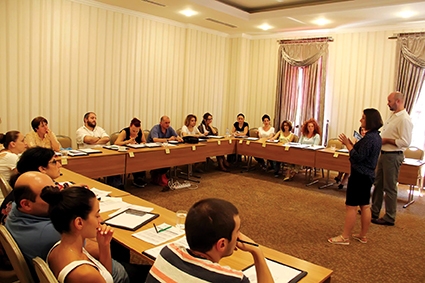Training Workshop Held in Adjara: How to Develop a Marketing Plan for Festivals
The British Council has been working for some time in successful partnership with the Ministry of Education, Culture and Sport of the Adjara Autonomous Republic in Georgia, within the signed collaboration memorandum.
Most recently, that cooperation developed into a new project. From 25 to 28 July, the British Council organized a training ‘How to Develop a Marketing Plan for Festivals’ conducted by the British Arts Marketing Trainer Owen Mcnair, representative of FEI-Festivals and Events International, a marketing and development professional with a “successful track record delivering short-term results and long-term sustainability in the Arts & Culture through strategic planning, training and mentoring”.
This is the second training for the festival professionals in Adjara, like the first providing delegates with the knowledge, understanding and a practical framework necessary to enable them to write a festival and event management plan. During the workshop, the participants discussed the aim and benefits of developing a marketing plan; who the audiences are; what they want and how to increase their number based on targeting and segmentation of audiences and needs analysis. Special focus was placed on targets and pricing, marketing toolkits, resources and campaign planning, monitoring and evaluation. Georgian festivals professionals were also given the opportunity to explore the experiences, achievements and challenges of UK festivals, making comparisons with their own experiences and share their achievements with the trainers from the UK and one another while taking on board useful experience from the UK experts.
“We are delighted to share the best UK experience with the festival professionals involved in our project, said Zaza Purtseladze, Director, British Council in Georgia. “Marketing is one of the key areas for the success of the festivals currently run in the Adjara region”.
The British Council is the UK’s international organization for cultural relations and educational opportunities. Using the UK’s cultural resources, it aims to make a positive contribution to the countries it works with – “changing lives by creating opportunities, building connections and engendering trust”.











